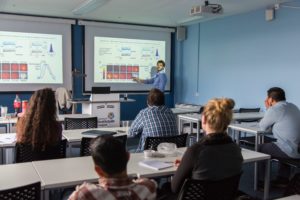 From late 2016 to the first half of 2017, SCOPE has continued organising the Strathclyde’s Physics Journal Club fortnightly with excellent participation and support from the students involved.
From late 2016 to the first half of 2017, SCOPE has continued organising the Strathclyde’s Physics Journal Club fortnightly with excellent participation and support from the students involved.
Keeping the spirit from the previous year, the aim of this activity was to both give the chapter members the opportunity to present some of the relevant papers in their field, or more broadly in general interest science, and also enhance the communication with other students, learning and talking about physics in a relaxed atmosphere. We aimed to develop a vital skill for young researchers: the ability to efficiently analyse and present a high-profile scientific paper. As many of the students were lacking this kind of activities in their own groups, we provided this student-run platform with great success.
Throughout the year, we tried to broaden the topics covered in the sessions ranging from plasma physics to biological lasers. At the same time, we focus a lot of our efforts in incorporating new people to the Journal Club. This lead to a nice attendance in all the sessions and benefitted other of our events as people got to know SCOPE through the Journal Club. We encouraged all our attendees to present at least once and thanks to that we managed to cover really diverse areas of physics. The presentations were usually 20 to 30 minutes long, supported by whiteboard sketches and slides, and it was followed by an informal discussion with some refreshments.
The rest of the students provided some feedback after the presentation helping the speakers improve their weaker points and together improving the understanding of the topic being discussed. To make this discussion as useful as possible, all the attendees had access to the presented papers a few days in advance to be able to familiarise themselves with the subject.
The success of the activity was also due to the fact that the activity was run by other students, reducing the anxiety of making mistakes or asking questions, and generating a suitable environment for group learning.
We are certain that this activity will remain valued by the students in the coming years. That’s why we are planning on maintaining it in the next academic year. As the activity requires a small budget we will be able to organise it without requiring further funding.
